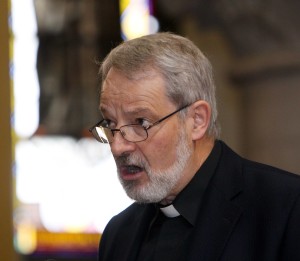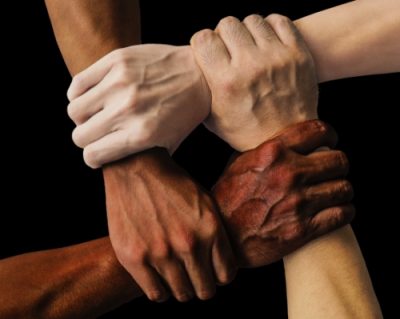
By Sarah Mac Donald - 21 August, 2019

Bishop Kevin Doran
The Bishop of Elphin has expressed concern over “disturbing signs of racial prejudice”, especially towards refugees and those “who don’t speak our language or share our culture”.
Writing in the September issue of Intercom magazine, Bishop Kevin Doran acknowledges that the majority of Irish people are welcoming of their “new neighbours”, but highlights his concerns.
In June this year, the bishops expressed their collective concern in their Summer General Statement over “the rising number of incidents of racism, xenophobia and religious intolerance in Ireland – carried out sometimes by those who consider themselves faithful Christians – and which can occur anonymously or otherwise on social media, in quiet conversations, by open verbal onslaughts or through physical violence.”
In his article titled “Rejecting Racism: Welcome, Protect, Promote and Integrate”, Bishop Doran asked why this would be happening in Ireland, “considering our strong missionary tradition and our ethos of support for the work of organisations such as Trócaire, Concern and Goal”.
Irish people, he acknowledged, generally know how to engage with people of other cultures and ethnic groups when they are “over there”, but he said somehow it can be more challenging when they are “over here”.
“Some of us may simply be uncomfortable with what is unfamiliar. Others, however, resent the very fact that these people are in ‘our’ space and are using ‘our’ resources and services.”
But, he continued, “Have we forgotten that many of ‘our’ essential services are provided by people who have come to Ireland from Eastern Europe, Africa, Asia and the Middle East? Have we lost sight of the fact that many of our own people have been and still are ‘strangers and sojourners’ in foreign lands (Deut 10:19)?”
Referring to Pope Francis’ teaching in this area, he noted that the Pontiff has said, “The problem is not that we have doubts and fears. The problem is when they condition our way of thinking and acting to the point of making us intolerant, closed and perhaps even – without realising it – racist.”
According to Dr Doran, while pragmatic racism has its roots in self-centred individualism, ideological racism has its roots in the refusal to accept the uniqueness and individuality of the other as a person.
“Ultimately, racism will not be eradicated without changing peoples’ hearts and forming new attitudes,” he stressed.
The section on Migrants and Refugees of the Dicastery for Integral Human Development, which is overseen directly by Pope Francis, has formulated Twenty Action Points as a contribution to the development of best practice in international law.
 It is summed up, Pope Francis has said, in four verbs: welcome, protect, promote and integrate.
It is summed up, Pope Francis has said, in four verbs: welcome, protect, promote and integrate.
In his article, Bishop Doran underlines that if the Church in Ireland is to respond to the vision of Catholic Social Teaching, “I believe we will need, both as a community and as individual Christians, to take action to prevent racism, or to root it out wherever it exists.”
Separately, the Bishop of Waterford and Lismore has hit out at “small political groups” trying to “stir up fear and suspicion between Muslims and Christians” in Ireland.
Bishop Phonsie Cullinan said he was shocked to learn that some of those who took part in a rally in Dublin last weekend had given Nazi salutes. The incident was witnessed by Green Party councillor Hazel Chu, who has been subjected to racist abuse on social media and in person.
Dr Cullinan was speaking to the Irish Independent in Butlerstown, Co. Waterford, where he attended the launch of the book Murder in the Missions. The book tells the story of two Irish missionaries, Fr Des Hartford and Fr Rufus Halley, who promoted dialogue between Muslims and Christians in the Philippines. Dr Cullinan said he was “absolutely shocked” to learn about the Nazi gesture.
“It is offensive, negative and a backward step. That is not what people of decent morals and values want.”
Asked about attempts by some anti-Muslim/anti-immigrant campaigners to exploit Christian symbols such as crosses to promote their message, the Bishop said, “This is not the way of Christ. Christ is a man of peace.”
He added that interpersonal relationships and friendships break down fears and barriers. “We can see unfortunately around the world that there are small political groups trying to stir up fear and suspicion and this is causing divisions in society which is not good.
“It is when there is no dialogue that fear and suspicion begin to grow and this is where terrorists and extremists and the tiny minority who don’t want peace begin to stir up these fears – so dialogue is essential.”
Dr Cullinan paid tribute to the many Muslims “living in total peace” in his diocese of Waterford and Lismore who he said are “getting to know us and we are getting to know them. We share a common humanity and see that we are all struggling through life and we need to help each other.”
Butlerstown parish was the home parish of Fr Rufus Halley, one of the subjects in the book launched on Sunday. He was murdered by Muslim extremists in August 2001 in Mindanao.
Bishop Cullinan paid tribute to Fr Halley for having “dedicated his life to the people of the Philippines and to relations between Christians and Muslims”.
The former Attorney General and president of the High Court, Harry Whelehan, who was a friend of the missionary’s, told CatholicIreland.net that ordinary Christians and Muslims need to be able to see each other as equals with different opinions about spiritual matters.
The 75-year-old hit out at those trying to stoke up tensions in Ireland, warning that it is “very easy to paint a slogan and be offensive, and it is very easy to get publicity and encourage an irresponsible mob reaction and generate hate.”
But he added that the harder work was the kind of bridge-building and peacemaking which Fr Rufus Halley and Fr Des Hartford did.